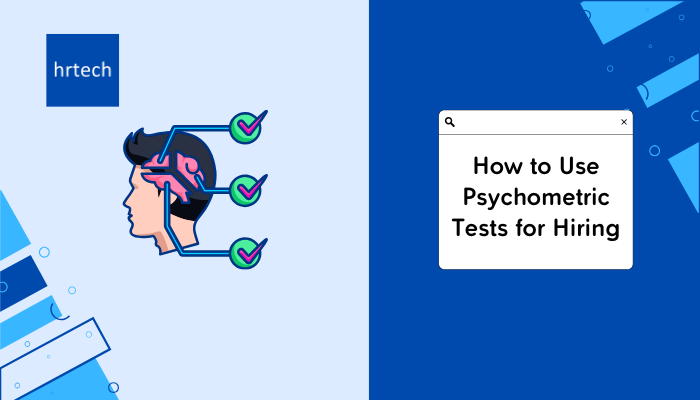Hiring the right candidate is no longer just about assessing technical expertise. In today’s dynamic job market, soft skills, personality traits, and cultural fit are equally critical in predicting a candidate’s success. However, identifying these intangible qualities during interviews or resume screenings can be challenging.
This is where psychometric tests come into play. These scientifically-backed assessments provide employers with measurable insights into candidates’ cognitive abilities, personality traits, and behavioural tendencies.
In this blog, we’ll explore how psychometric tests work, their benefits, best practices for implementation, and how Equip’s platform makes integrating these tests seamless and effective.
What Are Psychometric Tests?
Psychometric tests are more than just tools for evaluating candidates—they are a window into how individuals think, behave, and interact with others. This section defines psychometric tests, explains their types, and highlights their significance in predicting job performance and cultural fit.
Psychometric tests are structured assessments used to evaluate a candidate’s cognitive abilities, personality traits, and behavioural tendencies. These tests help employers predict whether a candidate has the mental capacity, work style, and interpersonal skills necessary to succeed in a specific role.
Different types of psychometric tests
- Cognitive ability tests
- Measure skills such as problem-solving, logical reasoning, numerical aptitude, and verbal comprehension.
- Ideal for roles requiring quick learning and adaptability.
- Personality assessments
- Evaluate traits such as extraversion, agreeableness, conscientiousness, openness, and emotional stability.
- Useful for determining cultural fit and interpersonal compatibility.
- Situational Judgement Tests (SJTs)
- Present hypothetical workplace scenarios to gauge a candidate’s decision-making, problem-solving, and conflict-resolution abilities.
- Emotional Intelligence (EI) Tests
- Assess a candidate’s ability to understand and manage their emotions while empathising with others.
- Critical for leadership and customer-facing roles.
Why are psychometric tests important?
Psychometric tests provide valuable insights into aspects of a candidate that interviews or resumes often overlook, such as:
- Their ability to handle job-specific challenges.
- Their potential to align with the company’s culture.
- Their long-term adaptability and growth potential.
What Are The Benefits Of Psychometric Tests In Hiring?
Adding psychometric tests to your hiring process can elevate the quality of your recruitment decisions. This section explores how these tests offer objective evaluations, reduce biases, and improve employee retention.
Key Benefits
- Objective evaluations
Psychometric tests provide measurable data, eliminating subjectivity and reducing reliance on gut feelings. This ensures hiring decisions are based on quantifiable insights. - In-depth understanding of candidates
These tests reveal how a candidate processes information, solves problems, and interacts with others, offering a deeper perspective on their potential. - Reduced hiring bias
By focusing on data, psychometric tests minimise unconscious biases that can influence traditional hiring processes, promoting a fairer and more inclusive approach. - Improved retention rates
Hiring candidates who align with the role and company culture reduces turnover rates and enhances overall employee satisfaction. - Cost efficiency
By improving the quality of hires, organisations save time and resources spent on rehiring and retraining, making psychometric testing a cost-effective strategy.
Ready to make the most out of this strategy? Let’s dive into how you can apply these tests effectively.
Best Practices For Using Psychometric Tests
To fully leverage psychometric tests, you need a strategic approach. This section outlines actionable best practices to ensure these assessments are used effectively and ethically in the hiring process.
Steps to optimise psychometric testing
- Define clear hiring objectives
- Identify the skills, traits, and behaviours crucial for the role.
- Use this clarity to select the most relevant psychometric tests.
- Combine tests with other assessments
- Psychometric results should complement technical evaluations for a well-rounded candidate profile.
- Consider using structured interviews alongside these tests for added context.
- Use reliable and validated tests
- Ensure the tests are scientifically backed, reliable, and culturally relevant to your candidate pool.
- Partner with trusted providers like Equip to access validated assessments.
- Provide feedback to candidates
- Offer candidates constructive feedback on their test results to demonstrate transparency and enhance your employer brand.
- Train hiring teams
- Educate recruiters and managers on how to interpret psychometric test results and incorporate them into hiring decisions effectively.
How Equip Simplifies Psychometric Testing?
While psychometric testing offers numerous advantages, managing these assessments can be complex. This section explains how Equip’s platform streamlines psychometric testing, making it accessible, efficient, and impactful for hiring managers.
Why Choose Equip?
- Comprehensive test library – Equip provides a rich library of psychometric tests for DISC, OCEAN and SJTs tailored for various industries and roles, especially in tech and digital sectors.
- AI-powered analytics – Equip uses AI to process and analyse test results, providing clear, actionable insights that enable hiring managers to make data-driven decisions.
- Seamless integration – The platform integrates effortlessly into your existing hiring workflow, from test administration to candidate evaluation, ensuring minimal disruption.
- Customisable solutions – Equip allows businesses to customize tests to align with specific hiring goals and organisational values.
Real-World Applications
The impact of psychometric testing is best understood through real-world examples. This section showcases case studies where organisations used Equip’s psychometric assessments to achieve measurable hiring success.
Got you curious about how others are nailing it with psychometric tests? Let’s check out some success stories!
Case Studies
- Improving employee retention
An IT company used Equip’s personality assessments to identify candidates who aligned with their collaborative work culture. This led to a significant improvement in retention rates within the first year. - Enhancing diversity
A global marketing agency adopted Equip’s psychometric tools to reduce unconscious bias. The result was an increase in diverse hires, contributing to a more innovative and inclusive workplace. - Optimising recruitment for leadership roles
A multinational corporation used Equip’s emotional intelligence tests to identify high-potential candidates for leadership positions. This approach resulted in faster onboarding and better team integration.
Conclusion
Psychometric tests have become a cornerstone of modern recruitment, offering a deeper understanding of candidates’ cognitive abilities, personality traits, and cultural fit. By integrating these assessments into your hiring process, you can make data-driven decisions, reduce bias, and improve overall hiring outcomes.
Equip takes the complexity out of psychometric testing with its user-friendly platform, advanced analytics, and customisable solutions tailored to your business needs.Ready to revolutionise your hiring process?Try Equip’s psychometric testing platform today with a free trial or demo and discover how it can help you find the perfect fit for your team!







